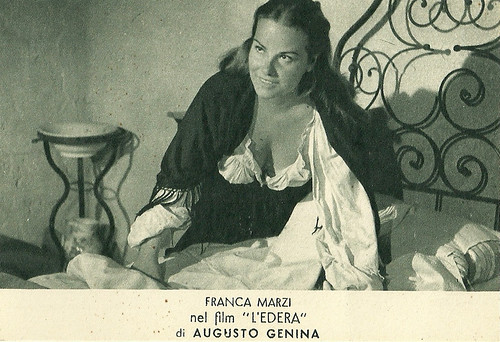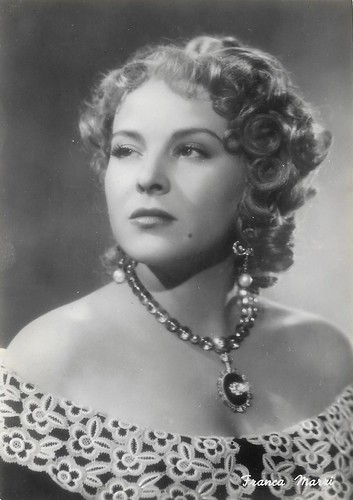
Italian postcard by Rotalfoto, Milano, no. 248.
Endowed with an explosive beauty and a sensual nonchalance
Franca Marzi was born Francesca Marsi in Rome in 1926. After having worked on stage in revues, and a bit part in the film Harlem (Carmine Gallone, 1943), Marzi officially debuted in the cinema when she was just over twenty years old, in Amanti in fuga / The Lovers (Giacomo Gentilomo, 1947).
Brunette, tall, endowed with an explosive beauty and a sensual nonchalance, she was often employed by the cinema in roles of the voluptuous girlfriend and femme fatale in sentimental or comic films.
She worked many times alongside Totò, with whom she acted from 1947 onward. First, she played an evil seductress in his I due orfanelli / The Two Orphans (Mario Mattoli, 1947).
Often, she was the second female protagonist, opposite Isa Barzizza. From the early 1950s, Mario Mattoli also directed her in comedies with Walter Chiari.
Opposite Nino Taranto, Virgilio Riento and Aroldo Tieri, Marzi had the female lead in a comedy set in Ancient times: Tizio, Caio e Sempronio / Tom, Dick, and Harry (Marcello Marchesi, Vittorio Metz, Alberto Pozzetti, 1951), co-scripted by Steno and Mario Monicelli.

Italian postcard by Ed. Mondadori. Photo: Prod. Cines. / Dist. ENIC / AGAR. Franca Marzi as Zana in L'edera / Delitto per amore / Devotion (Augusto Genina, 1950). L'edera was an Italian rural drama shot in Barbagia, Sardinia. Vitaliano Brancati contributed to the script, based on a novel by Grazia Deledda. The film quite closely follows the novel, which takes place in the province of Nuoro, but offers a less drastic finale
The prostitute Wanda
In addition to comedy Franca Marzi also acted in melodramas such as Calamita d'oro (Armando Fizzarotti, 1948) in which she was the title character; La figlia del peccato (Armando Ingegnero, 1949) starring Milly Vitale, and Ho sognato il paradiso (Giorgio Pâstina, 1950) with Vittorio Gassman.
Later melodramas were Santa Lucia luntana... (Aldo Vergano, 1951) and La trovatella di Milano (Giorgio Capitani, 1956) in which Marzi had the female lead opposite Massimo Serato. She also acted in historical dramas by Riccardo Freda and other directors, and crime films (Gialli) such as Delitto al luna park (Renato Polselli, 1952).
The only exception to these genre films is Fellini's famous film Le notti di Cabiria / Nights of Cabiria (Federico Fellini, 1957), in which she played the role of the prostitute Wanda, Giulietta Masina's best friend. For her effective interpretation in Fellini's film, Franca Marzi was awarded the Silver Ribbon (Nastro d'argento).
Immediately after, Marzi had a small part with Masina starring again in Fortunella (Eduardo De Filippo, 1958). From the early sixties, Franca Marzi gradually moved away from the screen. Her last film was Ecco noi per esempio... / Here we are for example .. (1977) alongside Adriano Celentano and Renato Pozzetto.
Franca Marzi was married to middleweight champion Franco Festucci. She passed away in Cinisello Balsamo in 1989. Marzi was 62.

Italian postcard by Bromofoto, Milano, no. 276.

Italian postcard by Bromostampa, Milano, no. 45.
Source: Wikipedia (Italian and English) and IMDb.
This post was last updated on 4 June 2025.
No comments:
Post a Comment